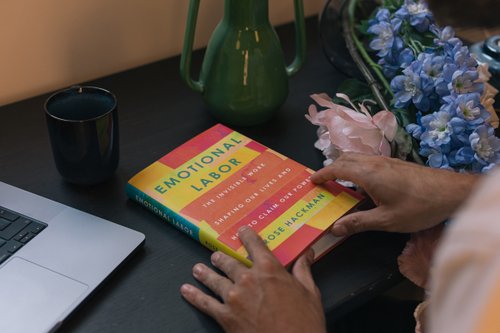How toxic positivity in the workplace damages our mental health
Sep 21, 2022
6 mins


Writer
Our first instinct when tragedy strikes is to turn to loved ones for support. Whether it’s about the loss of a job or — worse – the loss of a loved one, we hope friends will help ease the burden of stress or grief.
But too often, what we’re offered are platitudes about how “time heals all wounds” or that “everything happens for a reason.” While these are well-intentioned words meant to soothe, they tend to leave us even worse off: on top of the sadness, we now feel misunderstood and alienated.
Miami-based psychotherapist Whitney Goodman started speaking out about what she termed “toxic positivity” on her Instagram account @sitwithwhit in 2018, and the phrase quickly caught on. In her recent book “Toxic positivity: Keeping it real in a world obsessed with being happy,” she explores our society’s obsession with happiness and positivity, and its damaging effects on our mental health.
What is toxic positivity?
It’s the unrelenting pressure to be happy and positive and pursue happiness and positivity at all costs, no matter the circumstances. And it’s something that we can use against ourselves and others.
How did you first notice it?
I definitely noticed this obsession with happiness and positivity a lot as I was growing up but it wasn’t until I became a therapist that I noticed it was something that we were forcing onto people who were really struggling. Many people were really interested in the phrase. They had never heard of something like that but they all really recognized the concept. I realized it was something that we need to be talking about.
What were some of the negative consequences you observed?
It was making us feel very disconnected from one another. When people use toxic positivity in relationships it causes us to shut down, to feel like we’re distanced from one another and like people don’t understand us. It’s also causing a lot of isolation. If I feel like you don’t understand me, or you think I’m being dramatic, then I’m not going to share it with other people and I’m just going to suffer alone. And we know that leads to rises in suicide, isolation and loneliness.
The other thing that I noticed, especially during Covid, was that positivity was being used to silence people and tell them that “we’ve just got to get through this together. It’s all going to be okay.” We really see it being used as this cultural force to blame the individual, instead of the people in charge taking responsibility.
In your book you mention some of the classic toxic positivity phrases, like “just be happy,” and “everything happens for a reason,” that kind of thing. Are there any that you find particularly harmful?
The ones I dislike the most are probably “time heals all wounds,” “everything happens for a reason” and anything that like, “at least it’s not X,” or “just be grateful.” I find those are very unhelpful.
What would you say to someone who realises they’ve been spreading toxic positivity?
That it is part of our culture, it’s part of our language. It’s also constantly being sold to us through self-help, gurus and all that. I don’t blame anybody who’s been using this and that it’s part of their dialogue. And it’s all about learning. Like asking yourself: is this helpful to me? Is it serving me? Or is it really making me suppress my emotions and not feel better?
How do you know if you are pushing toxic positivity onto other people? There must be so many people who don’t realize that they’re doing something that can be quite harmful.
Toxic positivity at its core is dismissive. It shuts down the conversation and it tells the person that they shouldn’t be feeling what they’re feeling. So if you notice that you’re reaching for a platitude, you have to think: am I trying to make this person stop talking? Do I really know what’s upsetting them? Do I have an understanding of it? And is what I’m saying just a very simple solution for a complicated problem?
You mention that we find toxic positivity a lot in the workplace. Why is that?
The workplace is very prone to something called “groupthink,” which is really just consensus at any cost. We want everyone to be on the same page and to agree. And it’s usually just because those teams are easier to manage. There’s less complaining and less negativity, but what we find is that there’s a high cost for that consensus and that creativity really goes down. There can be a lot of discrimination, and profiling of certain employees. And we also find that people are just too scared to even talk about problems when that is the type of culture that’s being put forward.
So negativity and the ability to complain are actually very important, especially somewhere like in a big company where you have lots of different opinions. Is toxic positivity a way of silencing those voices?
Yes. When you think about problem solving, creativity, coming up with new ideas…That requires us to engage with negativity, and often people will be afraid to say “hey, this isn’t a good idea”, or “that’s not how I would do this,” because they’ve gotten in trouble for being insubordinate or talking back to somebody when really, there are very respectful and genuine ways of engaging with negativity and bringing it up in the workplace that can be very helpful.
I was particularly interested in the point that it stunts creativity. Can you explain that?
I think anybody who is in a creative industry knows that, typically, the way brainstorming works is you kind of have to think about problems and what is going wrong. What’s working and what needs to be fixed? When we get some sort of new technology, for example, that’s because somebody said “this isn’t working,” or “we need more of this.” So we have to recognize that when we’re doing a lot of good in the world every day it’s through the lens of negativity as a problem-solving tool.
What kind of advice would you give to a manager to avoid toxic positivity? What can they do?
I find that it’s very helpful when there are set systems for complaints, and for discussing problems. It might be people having a particular meeting during the week or one-on-one where they can voice their complaints. Also creating a culture in the office where people are allowed to respectfully share when things are going wrong and you respond back to them by saying, “okay, we’re going to look into that,” or “we’re going to talk about this at this time,” and really being purposeful about scheduling that in.
A culture that is obsessed with being happy and demanding that people are constantly performing has led to a lot of people experiencing burnout. What advice would you give to someone who’s gone through burnout, and how should they address toxic positivity?
It reminds me of that meme of the dog sitting in the house that is on fire and saying “this is fine.” That is the toxic positivity of burnout in a way: “Everything’s fine. It’s great. I’m doing okay.” But people have to look inward and say “something isn’t going right here. I’m not able to manage all this stuff. I’m not supposed to and it’s okay for me to reach out for help to identify areas that I can cut back on.” Try to put new systems in place to help because that’s usually what people need. Not necessarily a vacation. They need a reworking of where things are divided in their life and what they’re managing.
In your book, you also say “life is meant to be lived, not constantly improved.” Could you explain that?
Especially in the age of Instagram therapy and self-help, we’ve all become so obsessed with constantly optimizing ourselves, almost like we are machines that need to be getting better all the time. This type of approach will lead to burnout. I also think it stops you from enjoying life, and that’s why I’m such a big proponent of working on yourself and improving yourself, but also realizing what you want to get out of this experience of life. In the end, do you want to say I was perfect? Or do you want to have actually enjoyed something and had good experiences?
The phrase “good vibes only,” which also makes an appearance in the book, makes me think of people who shut certain people who are “negative” out of their life, in order to try to improve their lives and be happier themselves. Why do you think that has become a thing, and why is it dangerous?
I feel like we’ve been sold this idea that anything negative is bad and I don’t agree with that at all. Especially when it comes to labeling people as “negative.” There are of course abusive people who we have to set boundaries with, but what I’m talking about is people who may be depressed, anxious, or going through a hard time and that make us say “Oh, they’re bringing us down. They’re negative.” You never know when you’re going to find yourself in that place and need support. I think it could do us all a lot of good to be a little bit more compassionate and say, how can I set boundaries with this person? Maybe I can’t take on all of their stuff, but do I really need to cut them out of my life just because they’re struggling?
You started talking about toxic positivity on Instagram, which is where you started noticing it. Do you think social media has a very big role to play in this?
Absolutely. I think social media is where toxic positivity really spread, especially around the world. I feel like this started out as a very American thing, and I’ve since seen it spread so far. I think a lot of that is because social media has made it available everywhere and made it look very enticing. We look at these pictures of people who are wealthy and happy and they have all this stuff and we say “Oh, positivity. That’s, that’s what got them there.” And I think it’s easy to sell that on social media.
Photo: Whitney Goodman
Follow Welcome to the Jungle on Facebook, LinkedIn, and Instagram, and subscribe to our newsletter to get our latest articles every day!

More inspiration: Mental health

‘We need each other’: Monika Jiang on combating loneliness in hybrid work
Hybrid work offers flexibility but can leave us feeling disconnected. Monika Jiang explores how we can rebuild workplace connections.
Dec 19, 2024

Struggling at work? Here are 3 steps to rebuilding your self-esteem
Low on confidence? Learn how reflection, recharging, and refocusing can help you rebuild self-esteem and thrive professionally.
Nov 27, 2024

10 ways to beat the Sunday Scaries
Even people who love their jobs can experience the Sunday Scaries. Psychologist Karen Doll offers several strategies to help manage and overcome it.
Sep 12, 2024

Unpacking the burden of emotional labor
Rose Hackman’s "Emotional Labor" reveals how managing emotions impacts everyone, especially women and minorities.
Aug 08, 2024

Is financial anxiety harming your productivity?
Feeling overwhelmed by financial anxiety? You're not alone. Discover practical steps and expert advice to regain control of your work-life balance.
Jul 31, 2024
The newsletter that does the job
Want to keep up with the latest articles? Twice a week you can receive stories, jobs, and tips in your inbox.

Looking for your next job?
Over 200,000 people have found a job with Welcome to the Jungle.
Explore jobs